Land Law: Positive Covenants, Case Law, and Property Rights Analysis
VerifiedAdded on 2023/06/07
|6
|1360
|145
Essay
AI Summary
This land law essay delves into the complexities of positive covenants, exploring the courts' reluctance to enforce them and the problematic methods of enforcement. It examines the nature of positive covenants, which involve obligations like maintaining shared boundaries or roofs, and contrasts them with restrictive covenants. The essay highlights the challenges associated with positive covenants, such as the potential for express releases and the difficulties in ensuring fairness for successors. It analyzes relevant case law, including Rhone v Stephens, Wilkinson and Ors v Kerned Ltd, and Goodman and Ors v Elwood, to illustrate the practical issues. The essay also considers whether positive covenants, such as those requiring the repair of a boundary wall, should be enforceable against a buyer of the servient land, referencing the doctrine of benefits and burdens as established in cases like Hassall vs. Brazil and Davis vs. Jones, and exploring the implications of this principle on property rights and obligations. The essay concludes with a discussion on how the law addresses the repair of walls.
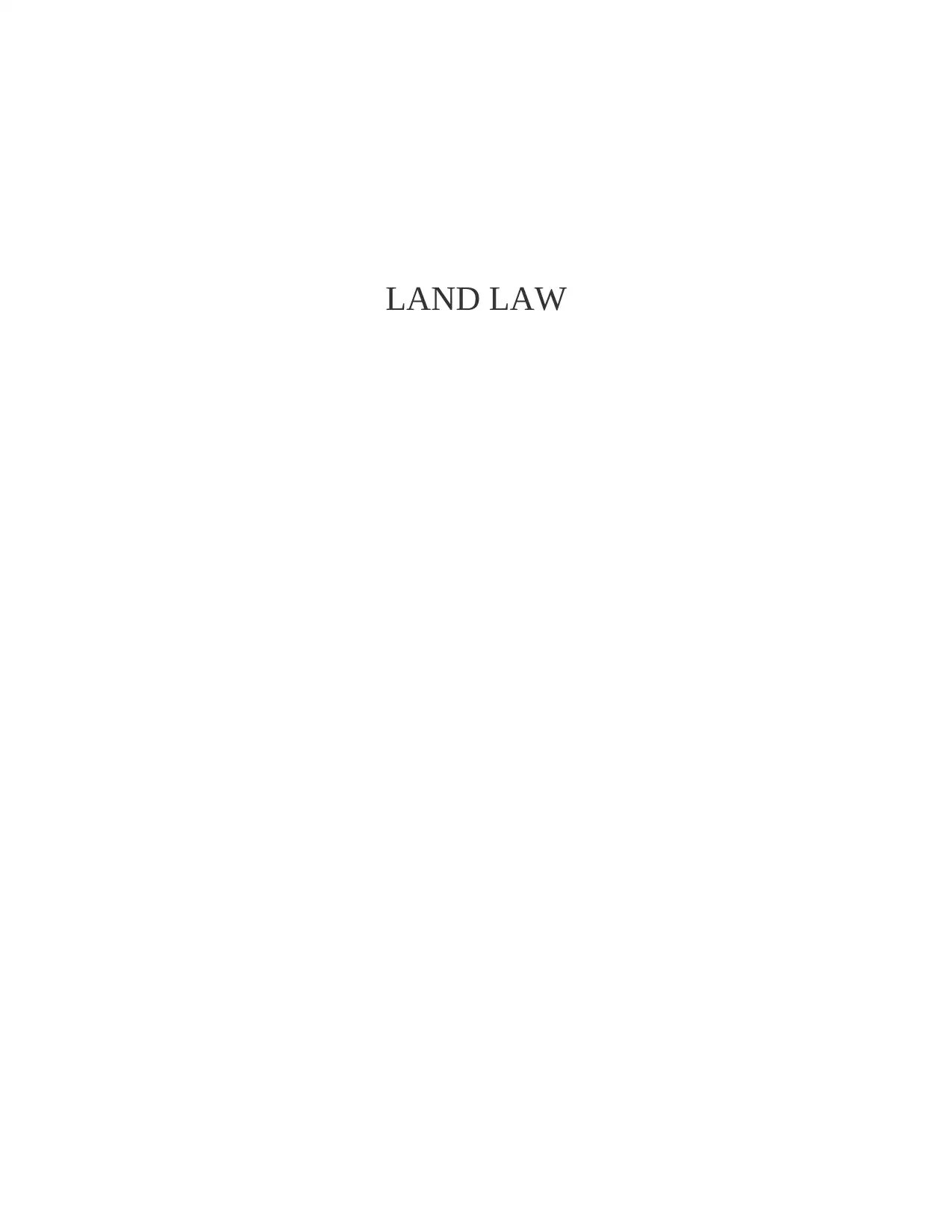
LAND LAW
Paraphrase This Document
Need a fresh take? Get an instant paraphrase of this document with our AI Paraphraser
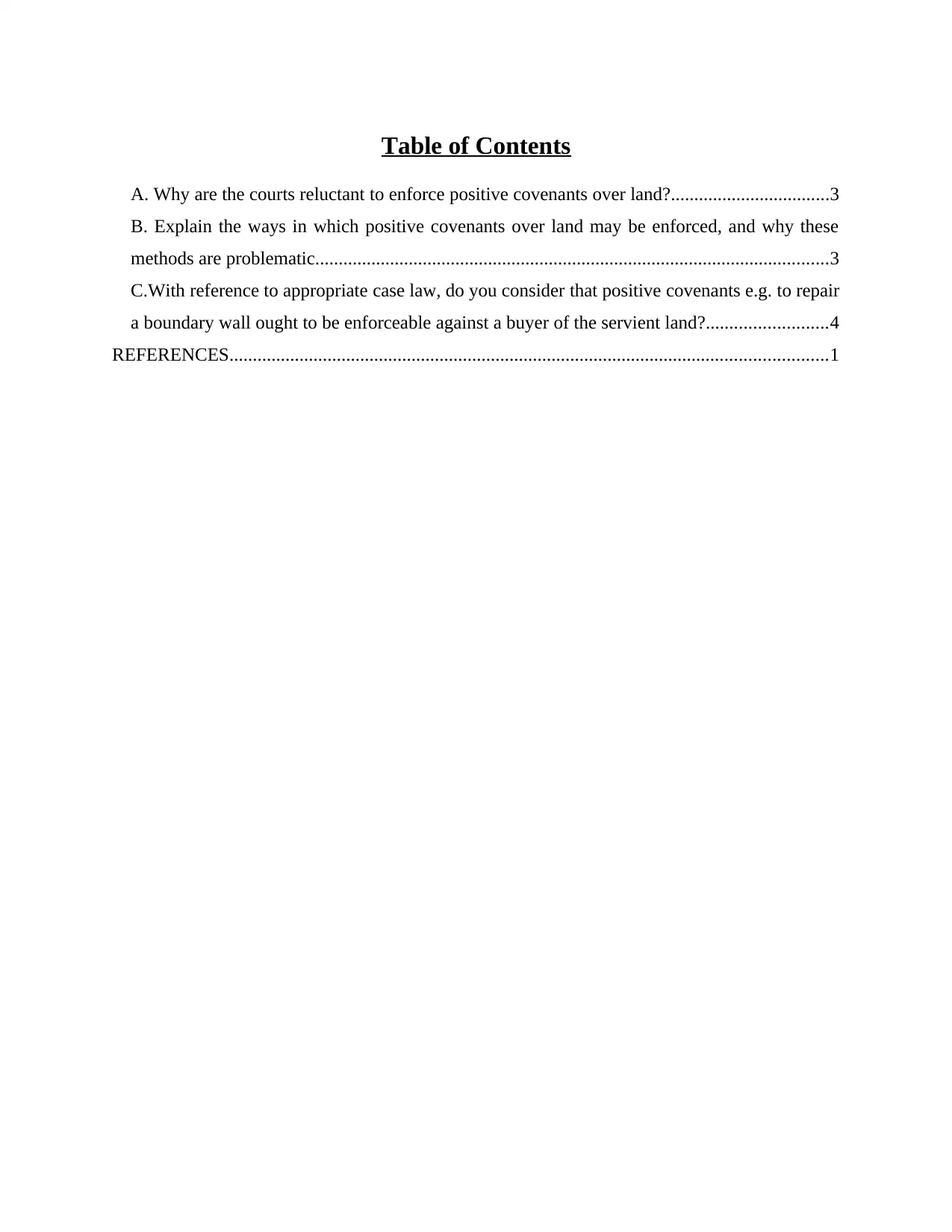
Table of Contents
A. Why are the courts reluctant to enforce positive covenants over land?..................................3
B. Explain the ways in which positive covenants over land may be enforced, and why these
methods are problematic..............................................................................................................3
C.With reference to appropriate case law, do you consider that positive covenants e.g. to repair
a boundary wall ought to be enforceable against a buyer of the servient land?..........................4
REFERENCES................................................................................................................................1
A. Why are the courts reluctant to enforce positive covenants over land?..................................3
B. Explain the ways in which positive covenants over land may be enforced, and why these
methods are problematic..............................................................................................................3
C.With reference to appropriate case law, do you consider that positive covenants e.g. to repair
a boundary wall ought to be enforceable against a buyer of the servient land?..........................4
REFERENCES................................................................................................................................1
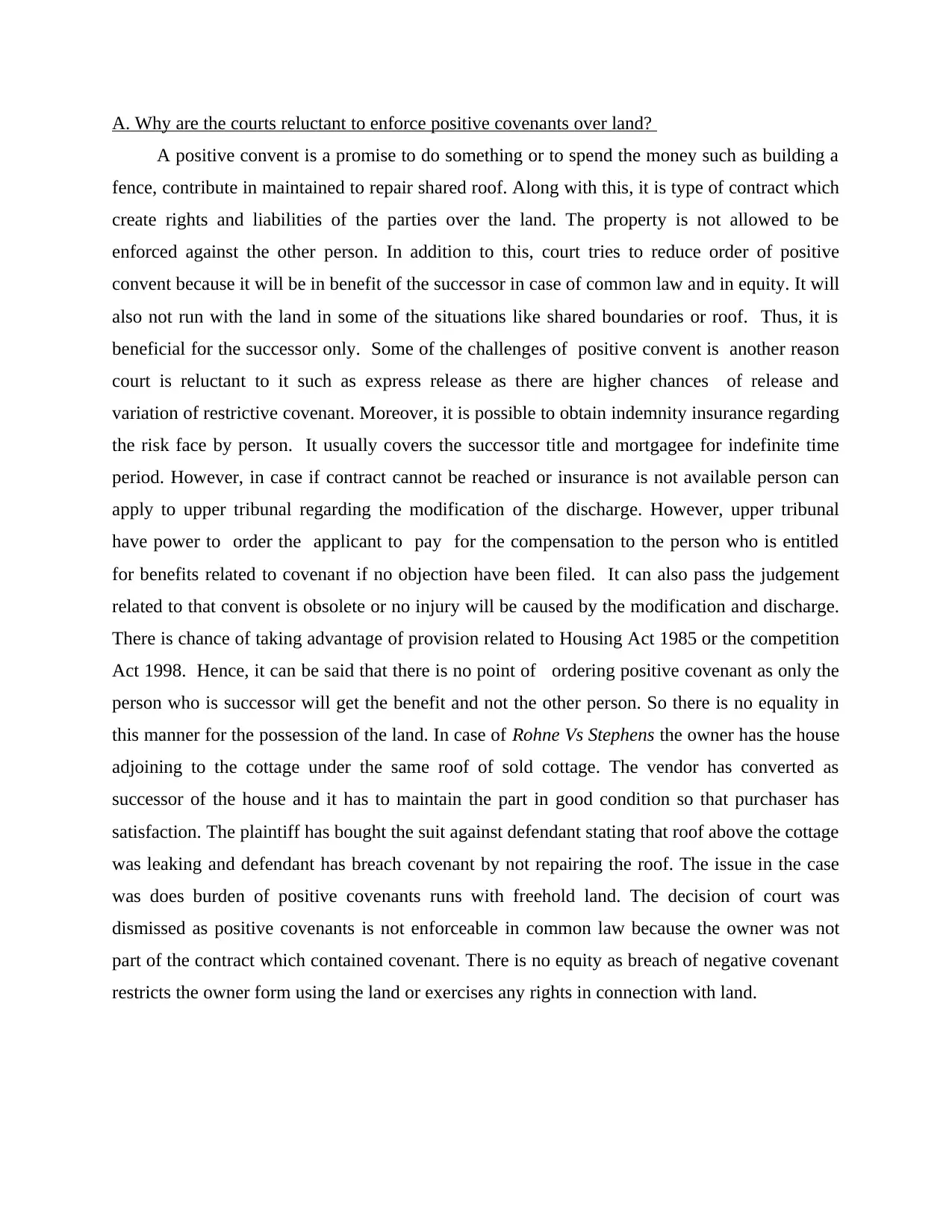
A. Why are the courts reluctant to enforce positive covenants over land?
A positive convent is a promise to do something or to spend the money such as building a
fence, contribute in maintained to repair shared roof. Along with this, it is type of contract which
create rights and liabilities of the parties over the land. The property is not allowed to be
enforced against the other person. In addition to this, court tries to reduce order of positive
convent because it will be in benefit of the successor in case of common law and in equity. It will
also not run with the land in some of the situations like shared boundaries or roof. Thus, it is
beneficial for the successor only. Some of the challenges of positive convent is another reason
court is reluctant to it such as express release as there are higher chances of release and
variation of restrictive covenant. Moreover, it is possible to obtain indemnity insurance regarding
the risk face by person. It usually covers the successor title and mortgagee for indefinite time
period. However, in case if contract cannot be reached or insurance is not available person can
apply to upper tribunal regarding the modification of the discharge. However, upper tribunal
have power to order the applicant to pay for the compensation to the person who is entitled
for benefits related to covenant if no objection have been filed. It can also pass the judgement
related to that convent is obsolete or no injury will be caused by the modification and discharge.
There is chance of taking advantage of provision related to Housing Act 1985 or the competition
Act 1998. Hence, it can be said that there is no point of ordering positive covenant as only the
person who is successor will get the benefit and not the other person. So there is no equality in
this manner for the possession of the land. In case of Rohne Vs Stephens the owner has the house
adjoining to the cottage under the same roof of sold cottage. The vendor has converted as
successor of the house and it has to maintain the part in good condition so that purchaser has
satisfaction. The plaintiff has bought the suit against defendant stating that roof above the cottage
was leaking and defendant has breach covenant by not repairing the roof. The issue in the case
was does burden of positive covenants runs with freehold land. The decision of court was
dismissed as positive covenants is not enforceable in common law because the owner was not
part of the contract which contained covenant. There is no equity as breach of negative covenant
restricts the owner form using the land or exercises any rights in connection with land.
A positive convent is a promise to do something or to spend the money such as building a
fence, contribute in maintained to repair shared roof. Along with this, it is type of contract which
create rights and liabilities of the parties over the land. The property is not allowed to be
enforced against the other person. In addition to this, court tries to reduce order of positive
convent because it will be in benefit of the successor in case of common law and in equity. It will
also not run with the land in some of the situations like shared boundaries or roof. Thus, it is
beneficial for the successor only. Some of the challenges of positive convent is another reason
court is reluctant to it such as express release as there are higher chances of release and
variation of restrictive covenant. Moreover, it is possible to obtain indemnity insurance regarding
the risk face by person. It usually covers the successor title and mortgagee for indefinite time
period. However, in case if contract cannot be reached or insurance is not available person can
apply to upper tribunal regarding the modification of the discharge. However, upper tribunal
have power to order the applicant to pay for the compensation to the person who is entitled
for benefits related to covenant if no objection have been filed. It can also pass the judgement
related to that convent is obsolete or no injury will be caused by the modification and discharge.
There is chance of taking advantage of provision related to Housing Act 1985 or the competition
Act 1998. Hence, it can be said that there is no point of ordering positive covenant as only the
person who is successor will get the benefit and not the other person. So there is no equality in
this manner for the possession of the land. In case of Rohne Vs Stephens the owner has the house
adjoining to the cottage under the same roof of sold cottage. The vendor has converted as
successor of the house and it has to maintain the part in good condition so that purchaser has
satisfaction. The plaintiff has bought the suit against defendant stating that roof above the cottage
was leaking and defendant has breach covenant by not repairing the roof. The issue in the case
was does burden of positive covenants runs with freehold land. The decision of court was
dismissed as positive covenants is not enforceable in common law because the owner was not
part of the contract which contained covenant. There is no equity as breach of negative covenant
restricts the owner form using the land or exercises any rights in connection with land.
⊘ This is a preview!⊘
Do you want full access?
Subscribe today to unlock all pages.

Trusted by 1+ million students worldwide
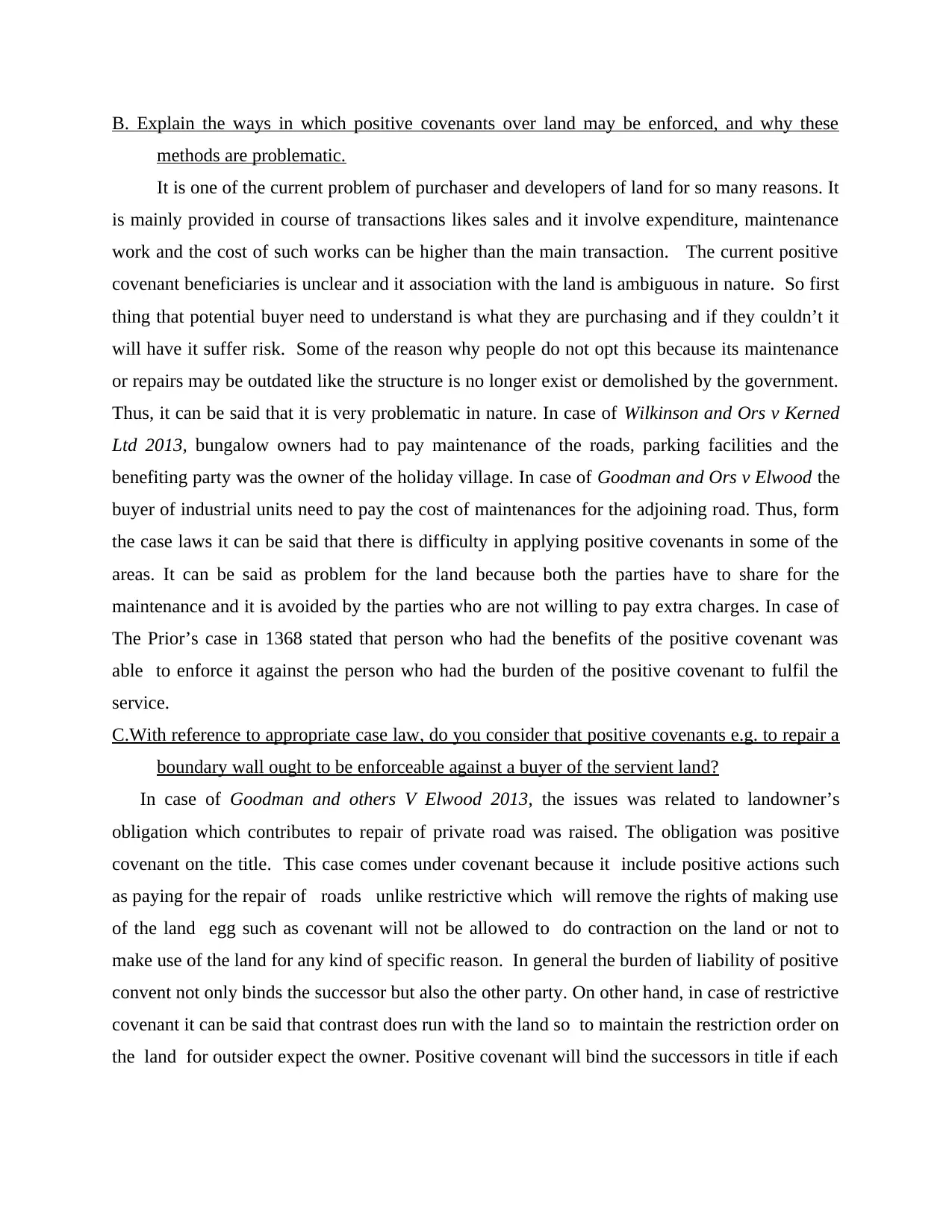
B. Explain the ways in which positive covenants over land may be enforced, and why these
methods are problematic.
It is one of the current problem of purchaser and developers of land for so many reasons. It
is mainly provided in course of transactions likes sales and it involve expenditure, maintenance
work and the cost of such works can be higher than the main transaction. The current positive
covenant beneficiaries is unclear and it association with the land is ambiguous in nature. So first
thing that potential buyer need to understand is what they are purchasing and if they couldn’t it
will have it suffer risk. Some of the reason why people do not opt this because its maintenance
or repairs may be outdated like the structure is no longer exist or demolished by the government.
Thus, it can be said that it is very problematic in nature. In case of Wilkinson and Ors v Kerned
Ltd 2013, bungalow owners had to pay maintenance of the roads, parking facilities and the
benefiting party was the owner of the holiday village. In case of Goodman and Ors v Elwood the
buyer of industrial units need to pay the cost of maintenances for the adjoining road. Thus, form
the case laws it can be said that there is difficulty in applying positive covenants in some of the
areas. It can be said as problem for the land because both the parties have to share for the
maintenance and it is avoided by the parties who are not willing to pay extra charges. In case of
The Prior’s case in 1368 stated that person who had the benefits of the positive covenant was
able to enforce it against the person who had the burden of the positive covenant to fulfil the
service.
C.With reference to appropriate case law, do you consider that positive covenants e.g. to repair a
boundary wall ought to be enforceable against a buyer of the servient land?
In case of Goodman and others V Elwood 2013, the issues was related to landowner’s
obligation which contributes to repair of private road was raised. The obligation was positive
covenant on the title. This case comes under covenant because it include positive actions such
as paying for the repair of roads unlike restrictive which will remove the rights of making use
of the land egg such as covenant will not be allowed to do contraction on the land or not to
make use of the land for any kind of specific reason. In general the burden of liability of positive
convent not only binds the successor but also the other party. On other hand, in case of restrictive
covenant it can be said that contrast does run with the land so to maintain the restriction order on
the land for outsider expect the owner. Positive covenant will bind the successors in title if each
methods are problematic.
It is one of the current problem of purchaser and developers of land for so many reasons. It
is mainly provided in course of transactions likes sales and it involve expenditure, maintenance
work and the cost of such works can be higher than the main transaction. The current positive
covenant beneficiaries is unclear and it association with the land is ambiguous in nature. So first
thing that potential buyer need to understand is what they are purchasing and if they couldn’t it
will have it suffer risk. Some of the reason why people do not opt this because its maintenance
or repairs may be outdated like the structure is no longer exist or demolished by the government.
Thus, it can be said that it is very problematic in nature. In case of Wilkinson and Ors v Kerned
Ltd 2013, bungalow owners had to pay maintenance of the roads, parking facilities and the
benefiting party was the owner of the holiday village. In case of Goodman and Ors v Elwood the
buyer of industrial units need to pay the cost of maintenances for the adjoining road. Thus, form
the case laws it can be said that there is difficulty in applying positive covenants in some of the
areas. It can be said as problem for the land because both the parties have to share for the
maintenance and it is avoided by the parties who are not willing to pay extra charges. In case of
The Prior’s case in 1368 stated that person who had the benefits of the positive covenant was
able to enforce it against the person who had the burden of the positive covenant to fulfil the
service.
C.With reference to appropriate case law, do you consider that positive covenants e.g. to repair a
boundary wall ought to be enforceable against a buyer of the servient land?
In case of Goodman and others V Elwood 2013, the issues was related to landowner’s
obligation which contributes to repair of private road was raised. The obligation was positive
covenant on the title. This case comes under covenant because it include positive actions such
as paying for the repair of roads unlike restrictive which will remove the rights of making use
of the land egg such as covenant will not be allowed to do contraction on the land or not to
make use of the land for any kind of specific reason. In general the burden of liability of positive
convent not only binds the successor but also the other party. On other hand, in case of restrictive
covenant it can be said that contrast does run with the land so to maintain the restriction order on
the land for outsider expect the owner. Positive covenant will bind the successors in title if each
Paraphrase This Document
Need a fresh take? Get an instant paraphrase of this document with our AI Paraphraser
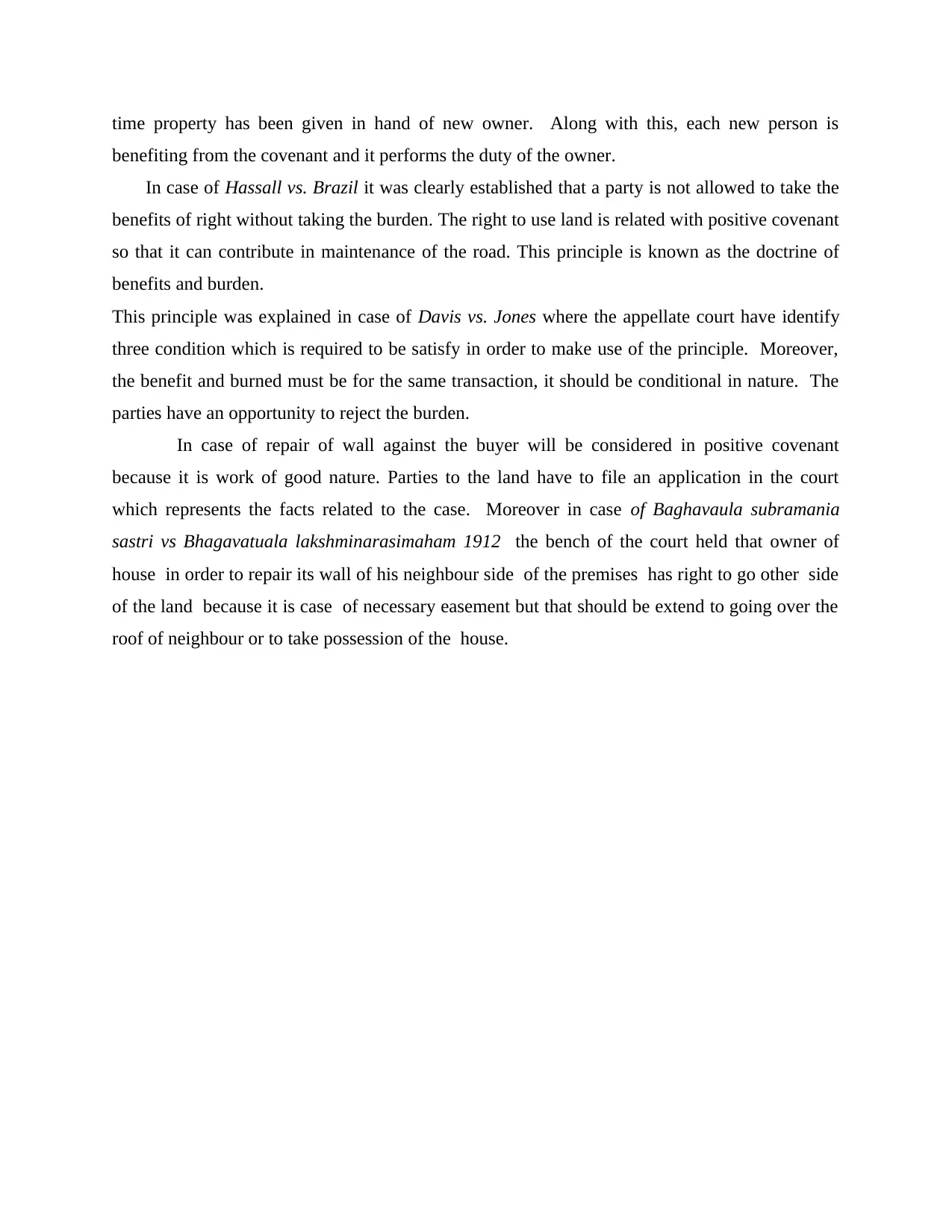
time property has been given in hand of new owner. Along with this, each new person is
benefiting from the covenant and it performs the duty of the owner.
In case of Hassall vs. Brazil it was clearly established that a party is not allowed to take the
benefits of right without taking the burden. The right to use land is related with positive covenant
so that it can contribute in maintenance of the road. This principle is known as the doctrine of
benefits and burden.
This principle was explained in case of Davis vs. Jones where the appellate court have identify
three condition which is required to be satisfy in order to make use of the principle. Moreover,
the benefit and burned must be for the same transaction, it should be conditional in nature. The
parties have an opportunity to reject the burden.
In case of repair of wall against the buyer will be considered in positive covenant
because it is work of good nature. Parties to the land have to file an application in the court
which represents the facts related to the case. Moreover in case of Baghavaula subramania
sastri vs Bhagavatuala lakshminarasimaham 1912 the bench of the court held that owner of
house in order to repair its wall of his neighbour side of the premises has right to go other side
of the land because it is case of necessary easement but that should be extend to going over the
roof of neighbour or to take possession of the house.
benefiting from the covenant and it performs the duty of the owner.
In case of Hassall vs. Brazil it was clearly established that a party is not allowed to take the
benefits of right without taking the burden. The right to use land is related with positive covenant
so that it can contribute in maintenance of the road. This principle is known as the doctrine of
benefits and burden.
This principle was explained in case of Davis vs. Jones where the appellate court have identify
three condition which is required to be satisfy in order to make use of the principle. Moreover,
the benefit and burned must be for the same transaction, it should be conditional in nature. The
parties have an opportunity to reject the burden.
In case of repair of wall against the buyer will be considered in positive covenant
because it is work of good nature. Parties to the land have to file an application in the court
which represents the facts related to the case. Moreover in case of Baghavaula subramania
sastri vs Bhagavatuala lakshminarasimaham 1912 the bench of the court held that owner of
house in order to repair its wall of his neighbour side of the premises has right to go other side
of the land because it is case of necessary easement but that should be extend to going over the
roof of neighbour or to take possession of the house.

1
⊘ This is a preview!⊘
Do you want full access?
Subscribe today to unlock all pages.

Trusted by 1+ million students worldwide
1 out of 6
Your All-in-One AI-Powered Toolkit for Academic Success.
+13062052269
info@desklib.com
Available 24*7 on WhatsApp / Email
![[object Object]](/_next/static/media/star-bottom.7253800d.svg)
Unlock your academic potential
Copyright © 2020–2025 A2Z Services. All Rights Reserved. Developed and managed by ZUCOL.
